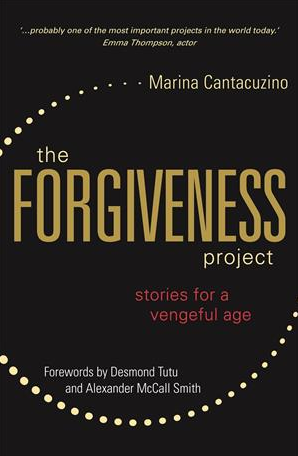The Forgiveness Project: Stories for a Vengeful Age by Marina Cantacuzino

The challenging introductory essay by Marina Cantacuzino sets the stories in the context of approaches to forgiveness, from both the religious and secular viewpoints, concluding that in the reality of lived expectations, forgiveness has a quality as mysterious as love. The book includes two forewords by Nobel Peace Prize winner Archbishop Desmond Tutu and award-winning author, Alexander McCall Smith.
As someone who has never had the experience of a loved one being slain by the hand of another or never having been involved with such crimes, I initially found this book to be mind blowing. How can forgiveness come into the equation?
By being taken, story by story, through situations where perpetrator meets victim, I was immensely struck by the courage of each one. Each person, a victim, in his or her own way had embarked on a journey that gave hope to themselves - and to me.
Sammy had such an abusive childhood that at the age of 11 he joined a gang and spent the next years in and out of prison. While in the segregation hole, a guy called George came to talk with him, took off his chains and listened to his whole story. This began to build trust, which enabled Sammy to go into rehabilitation and begin to get his life together.
Bud Welch’s 23-year old daughter was killed in the bombing of the Murray Federal Building in Oklahoma city with 167 others. Bud realised that using alcohol to fuel his anger and rage was unproductive. He understood that revenge and hate had killed Julie. During the next months he met and became friends with (the bomber) Tim McVeigh’s father and sister. A weight began to lift from his shoulders. Bud forgave Tim McVeigh about a year before McVeigh’s execution. This was a release for himself.
Gill Hicks lost both her legs when suicide bombers attacked the London’s Underground System in July 2005. As she lay waiting for help in the blackened train carriage, she was able to think. In that time she was offered the choice of Life. There were two voices holding a powerful but conflicting conversation in her head -- one told her to hold on, that there was much to achieve, and that her life could make a positive difference; the other voice was calling her softly telling her it was alright to let go and drift to a permanent sleep. Both sides were stating their case between life and death.
Luckily for us, Gill chose to live. When she awoke, she felt blessed. She promised herself that if she survived she would honour the gift of life by giving all to make a greater contribution to the world. Gill gave birth to a daughter in 2013. Through her life struggle and courage, she has done just that.
This book is a roller-coaster read. Despite all the trauma and violence, one comes out with an invitation to move forward with hope. - By Joyce Fraser
- Available from The Book Depository, with free delivery worldwide

